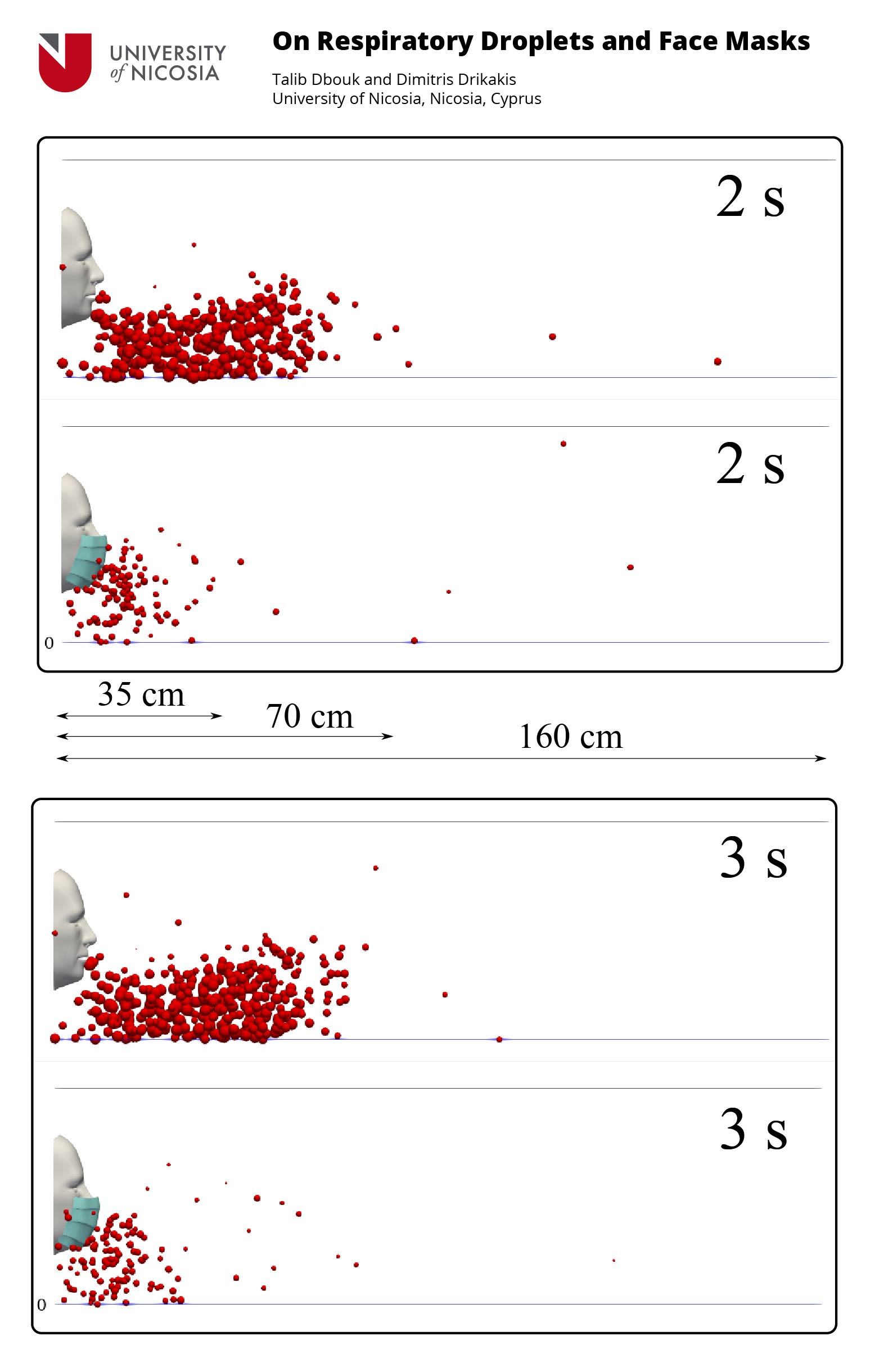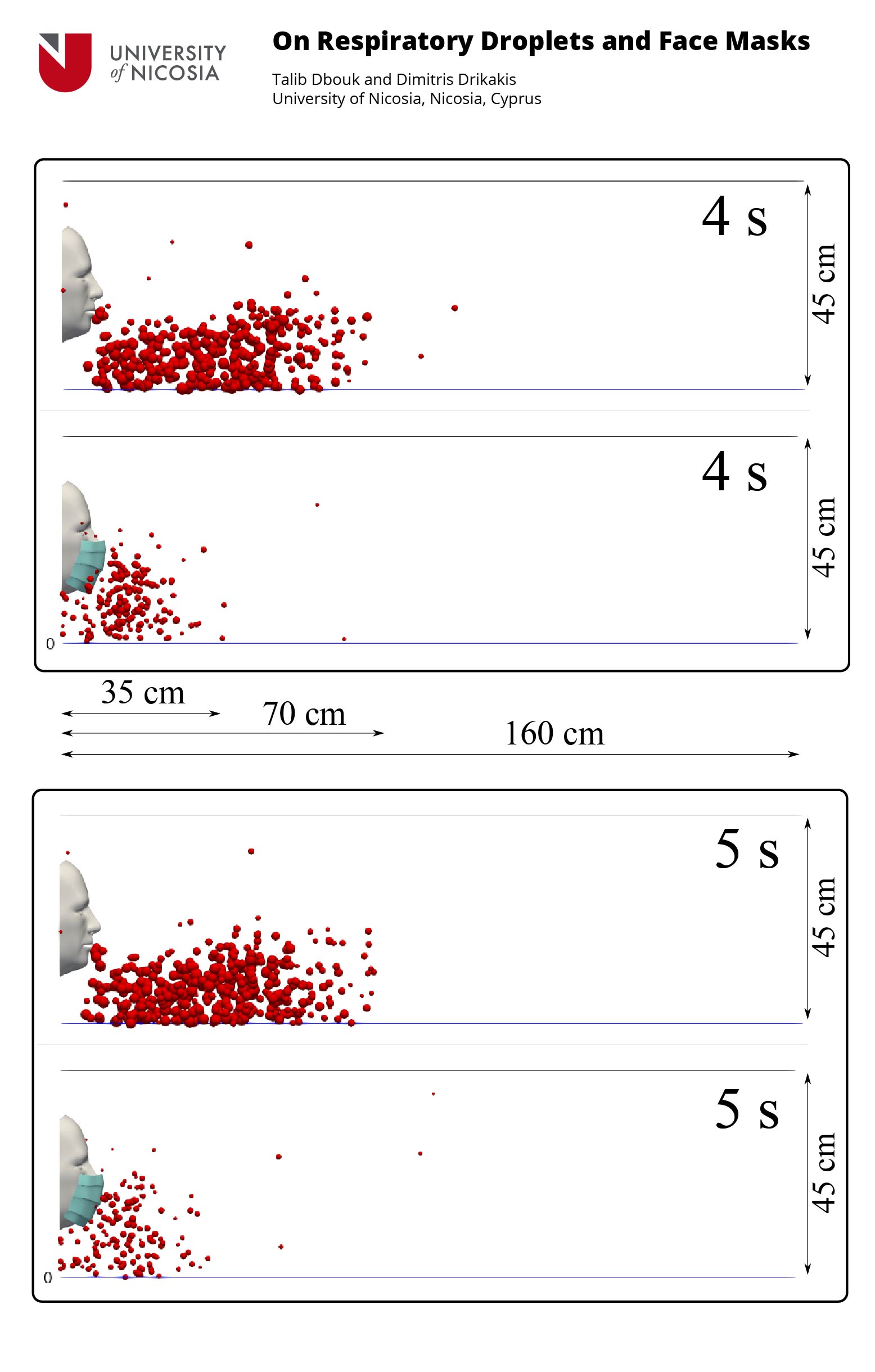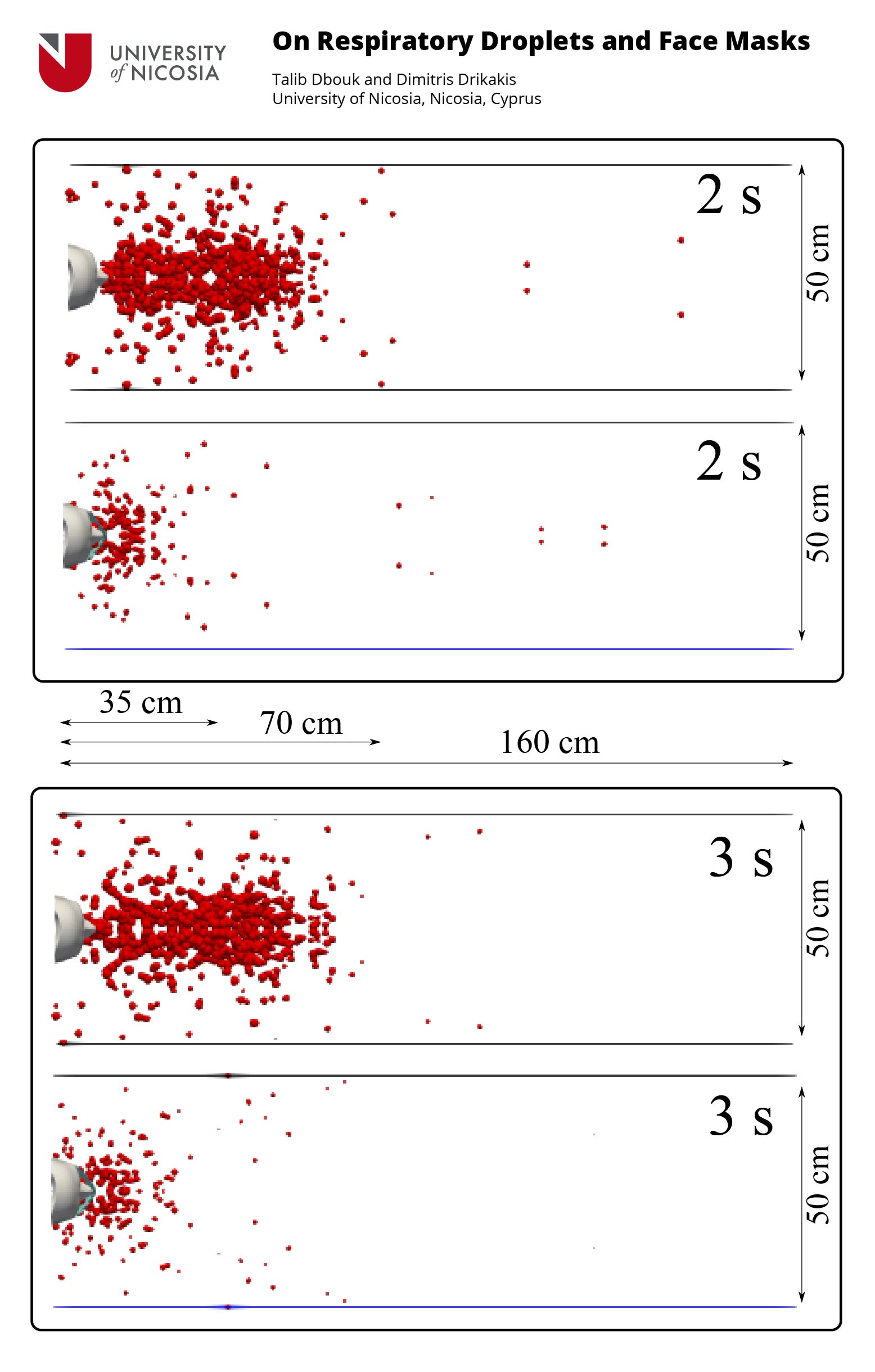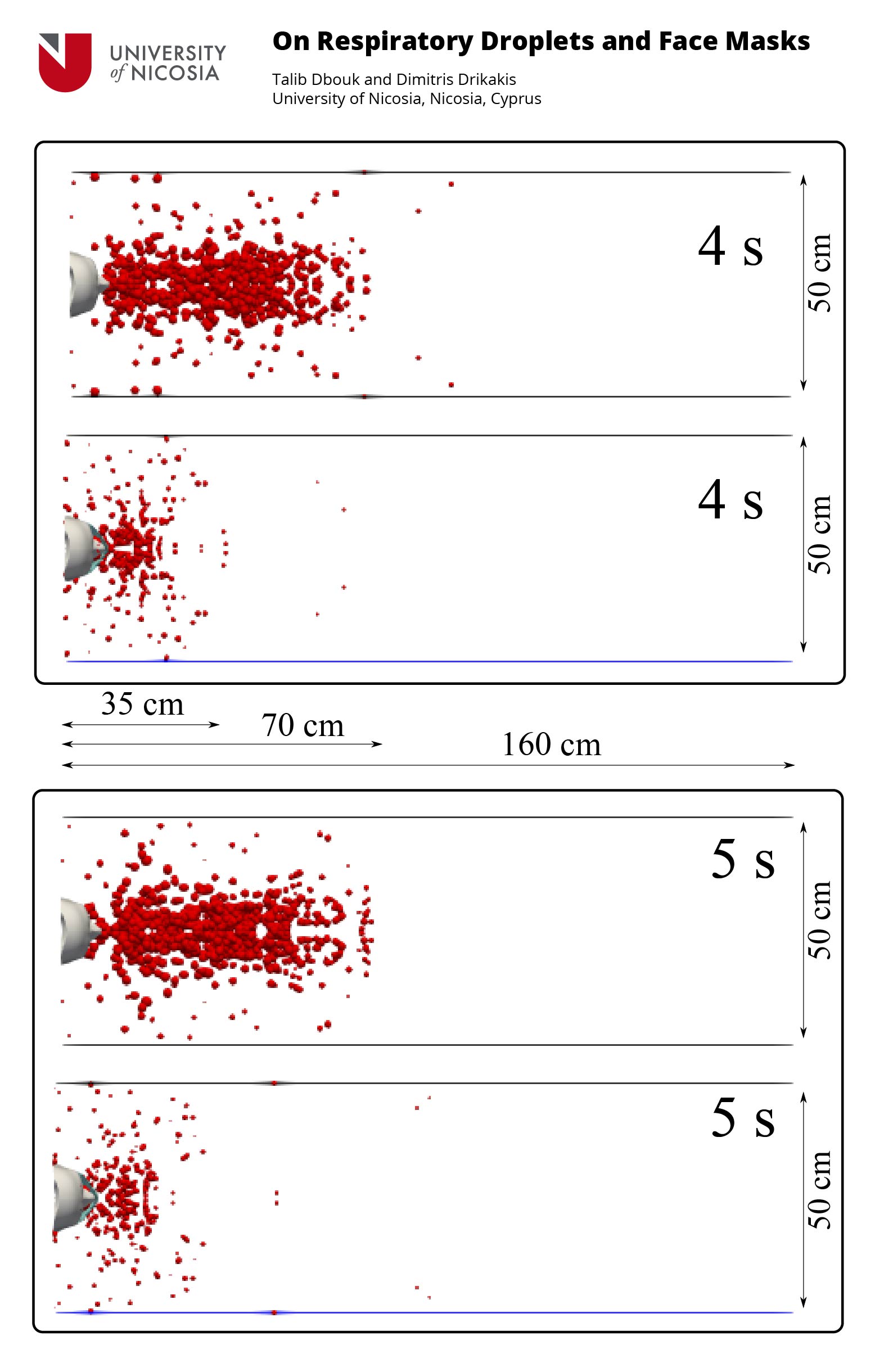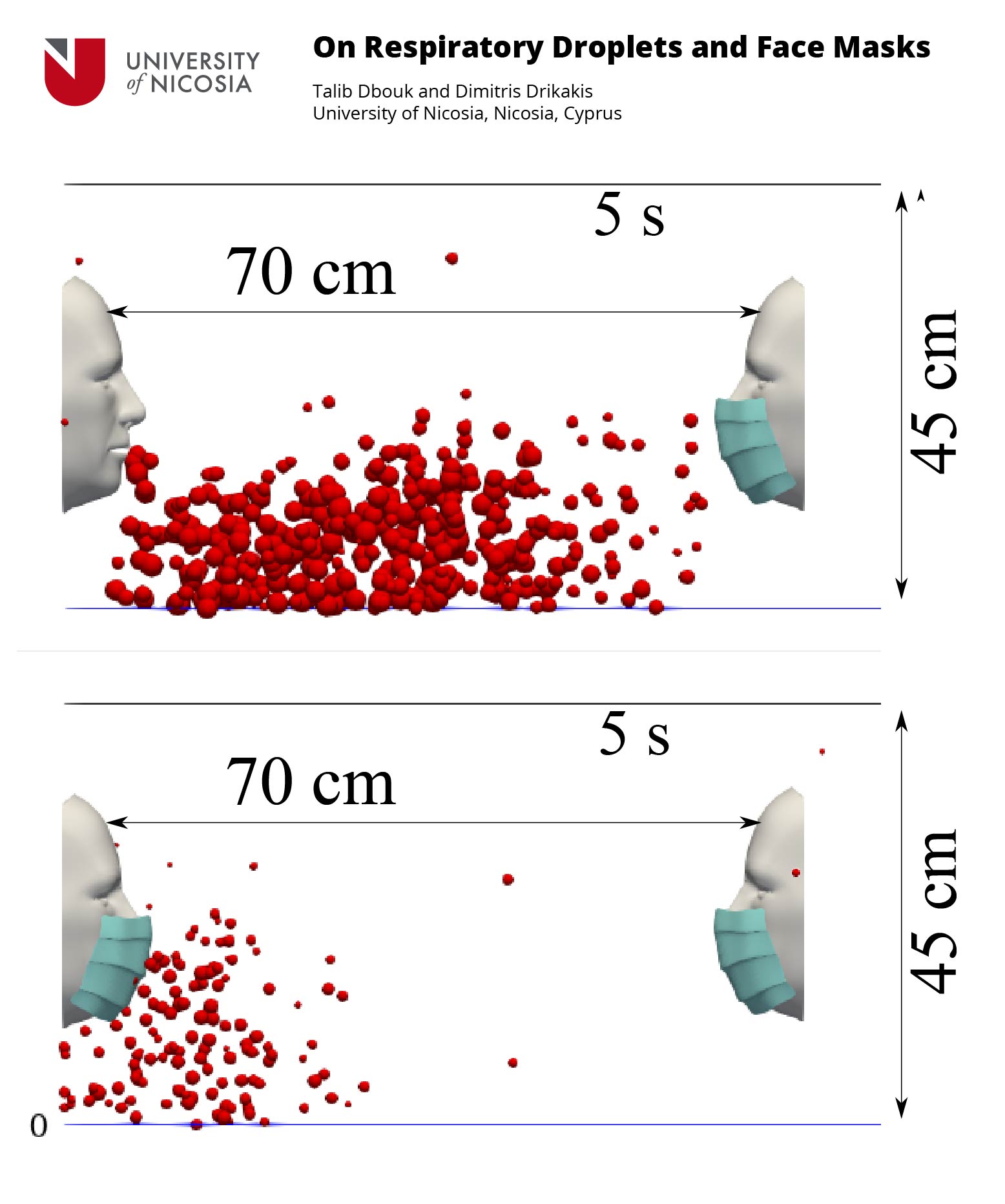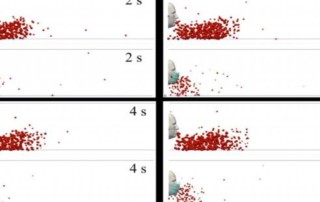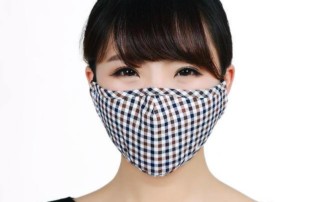COVID-19
UNIC Coronavirus Health and Research Portal
On Respiratory Droplets and Face Masks
Talib Dbouk and Dimitris Drikakis
University of Nicosia, Nicosia, Cyprus
Face mask filters – textile, surgical or respiratory – are widely used in the effort to limit the spread of airborne viral infections. Our understanding of the droplet dynamics around a face mask filter, including the droplet containment, leakage from and passing through the cover, is incomplete.
The authors present a fluid dynamics study of the transmission of respiratory droplets through and around a face mask filter. By employing multiphase computational fluid dynamics Dbouk & Drikakis investigate the droplet dynamics induced by a mild coughing incident and examine the fluid dynamics phenomena affecting the mask efficiency. The model takes into account turbulent dispersion forces, droplet phase-change, evaporation, and breakup in addition to the droplet–droplet and droplet–air interactions. The model mimics real events by using data which closely resemble cough experiments.
The study shows that the criteria employed for assessing the face mask performance must be modified to take into account: the penetration dynamics of airborne droplet transmission, the fluid dynamics leakage around the filter, and reduction of efficiency during cough cycles. A new criterion for calculating more accurately the mask efficiency by taking into account the penetration dynamics, is proposed.
We show that the use of masks will reduce the airborne droplet transmission and will also protect the wearer from the droplets expelled from other subjects. However, many droplets still spread around and away from the cover, cumulatively, during cough cycles. Therefore, the use of a mask does not provide complete protection, and social distancing remains important during a pandemic. The implications of the reduced mask efficiency and respiratory droplet transmission away from the mask are even more critical for healthcare workers. The results of this study provide evidence of droplet transmission prevention by face masks, which can guide their use and further improvement.
Figure 1
A subject coughing in a cyclic incidence. A qualitative examination of airborne droplet transmission with and without wearing a surgical mask. The top and bottom figures show the results at 2 s and 3 s, respectively. Wearing a surgical mask that exhibits an initial efficiency of ∼91%. This cannot prevent the transport of the saliva droplets away from the subject. Many droplets penetrate the mask shield and some saliva droplet disease-carrier particles can travel more than 1.2 m. For visualization, the droplets were scaled by a factor of 600 compared to their actual size. The environmental conditions are zero wind speed, ambient temperature 20 ○C, pressure 1 atm, and relative humidity 50%. The mouth temperature is 34 ○C and the face skin temperature is 32 ○C.
Figure 2
A subject coughing in a cyclic incidence. A qualitative examination of airborne droplet transmission with and without wearing a surgical mask. The top and bottom figures show the results at 4 s and 5 s, respectively. Wearing a surgical mask that exhibits initial efficiency of ∼91%. This cannot prevent the transport of the saliva droplets away from the subject. Many droplets penetrate the mask shield and some saliva droplet disease-carrier particles can travel more than 1.2 m. For visualization, the droplets were scaled by a factor of 600 compared to their actual size. The environmental conditions are zero wind speed, ambient temperature 20 ○C, pressure 1 atm, and relative humidity 50%. The mouth temperature is 34 ○C, and the face skin temperature is 32 ○ C.
Figure 3
A subject coughing in a cyclic incidence. Top view of a qualitative examination of airborne droplet transmission with and without wearing a surgical mask. The top and bottom figures show the results at 2 s and 3 s, respectively. We consider a surgical mask that exhibits initial efficiency of ∼91%. The cover does not prevent the transport of the saliva droplets entirely away from the subject. Many droplets penetrate the mask shield, and some saliva droplet disease-carrier particles can travel more than 1.2 m. For visualization, the droplets were scaled by a factor of 600 compared to their actual size. The environmental conditions are zero wind speed, ambient temperature 20 ○C, pressure 1 atm, and relative humidity 50%. The mouth temperature is 34 ○C, and the face skin temperature is 32 ○C.
Figure 4
A subject coughing in a cyclic incidence. Top view of airborne droplet transmission with and without wearing a surgical mask. The top and bottom figures show the results at 4 s and 5 s, respectively. We consider a surgical mask that exhibits an initial efficiency of ∼91%. The cover does not prevent the transport of the saliva droplets entirely away from the subject. Many droplets penetrate the mask shield and some saliva droplet disease-carrier particles can travel more than 1.2 m. For visualization, the droplets were scaled by a factor of 600 compared to their actual size. The environmental conditions are zero wind speed, ambient temperature 20 ○C, pressure 1 atm, and relative humidity 50%. The mouth temperature is 34 ○C, and the face skin temperature is 32 ○C.
Figure 5
Mask wearer: subjects wearing a mask will reduce the respiratory droplet transmission while (partially) shielding themselves from other subjects experiencing a coughing incident. We show the results at 5 s simulation time for a surgical mask exhibiting an initial efficiency of ∼91%. The environmental conditions are zero wind speed, ambient temperature 20 ○C, pressure 1 atm, and relative humidity 50%. The mouth temperature is 34 ○C and the face skin temperature is 32 ○C.
What Does This Mean?
According to the results of this study, the authors made recommendations that are summarised below:
- Although masks will reduce the droplet transmission, we should not ignore that several droplets will be transmitted away from the mask. The use of a mask will not provide complete prevention from airborne droplet transmission. The above is particularly important, both for indoor and outdoor environments. As Dbouk and Drikakis showed in a previous study (https://aip.scitation.org/doi/10.1063/5.0011960) respiratory droplets can be transmitted to several meters away from the subject due to wind conditions. Therefore, social distancing remains essential when facing an evolving pandemic.
- The above recommendation implies that we can protect healthcare workers only if we equip them with a complete PPE, e.g., completely a helmet with a built-in air filter, a face shield together with a disposable suit over the whole ensemble and a double set of gloves.
- The manufacturers and regulatory authorities should consider new criteria for assessing mask performance, to account for the flow physics and cough dynamics. The authors provided a simple criterion that takes into account the efficiency reduction during a cyclic coughing incident.
Video 1
A subject coughing in a cyclic incidence. A qualitative examination of airborne droplet transmission with and without wearing a surgical mask.
The University of Nicosia (UNIC)
About the University of Nicosia
The University of Nicosia (UNIC) is the largest university in Cyprus, and the largest university in southern Europe that teaches primarily in English, welcoming 12,000+ students from over 70 countries worldwide. The University of Nicosia is a comprehensive university with 6 schools, 20 departments and over 100 degree programs offered on-campus and online.
The University of Nicosia is best known in the fields of medicine, law, blockchain, accounting, education, forecasting and international relations and for a series of partnerships with other leading European universities. UNIC was most recently ranked #106 in its region by QS and #300 to #400 globally in the Times Higher Education Impact rankings.
To learn more about the University of Nicosia, please see: https://www.unic.ac.cy/
UNIC’s COVID-19 Response
University of Nicosia faculty across a variety of academic disciplines are actively engaged in research and analysis and serving in scientific / public policy roles supporting the global COVID-19 response.
For more information about the University of Nicosia’s work relating to COVID-19 including potential collaboration, please see: https://www.unic.ac.cy/coronavirus/
Contact Information
For more information about this study, please contact Prof Dimitris Drikakis at drikakis.d@unic.ac.cy.
For more information on our COVID-19 related research in general, please contact UNIC at covid19@unic.ac.cy.
Press Coverage
Articles and press mentions in global media about the research.
Coronavirus tosse danneggia mascherine, goccioline fino a un metro
Coronavirus tosse danneggia mascherine, goccioline fino a un metro Tosse: nemico “mortale” delle mascherine anti coronavirus. In uno studio su Physics of Fluids, i ricercatori Talib Dbouk e Dimitris Drikakis dell’Università di Nicosia a Cipro utilizzano precisi modelli computerizzati. Per mappare gli schemi del flusso delle goccioline emesse quando una persona che indossa una mascherina chirurgica tossisce ripetutamente. Filtraggio compromesso I risultati dello studio sono analizzati online per Adnkronos da Margherita Lopes in un articolo. Gli attacchi di tosse, si è [...]
Pelosi wants masks mandatory during hearings | Fox News
Pelosi wants masks mandatory during hearings House Speaker Nancy Pelosi wants committee leaders in the House to bar any lawmaker who refuses to wear face masks from participating in committee hearings, a source told Fox News Tuesday. A senior Democratic aide familiar with the issue said the California Democrat is urging these leaders to invoke their authority under Rule 11 to enforce rules of decorum. Her office did not immediately respond to an after-hours call from Fox News. Read the [...]
Repeated coughing seriously degrades face mask efficiency: Study
Repeated coughing seriously degrades face mask efficiency: Study – India4u London, June 17 : Face masks slow the spread of viruses, including the novel coronavirus that causes Covid-19, but their filtering efficiency is adversely affected by repeated coughing, say researchers."Masks decrease droplet accumulation during repeated cough cycles. However, it remains unclear whether large droplets or small ones are more infectious," said study researcher Talib Dbouk from the University of Nicosia in Cyprus. For the findings, published in the journal Physics [...]
La tos repetitiva degrada gravemente la eficacia de las mascarillas
La tos repetitiva degrada gravemente la eficacia de las mascarillas Las gotas de saliva pueden llegar a viajar incluso más alla de un metro en un ataque de tos de cinco segundos Cada vez más investigaciones científicas apuntan a la eficacia de las mascarillas como método de freno del nuevo coronavirus. Sin embargo, existen menos estudios sobre cómo se degradan con el uso, a pesar de que mucha gente las reutiliza en varias ocasiones, incluso por encima de su vida [...]
研究发现反复咳嗽会严重降低口罩的使用效率_腾讯网
研究发现反复咳嗽会严重降低口罩的使用效率_腾讯网 塞浦路斯尼科西亚大学的Talib Dbouk和Dimitris Drikakis在AIP Publishing发行的《流体物理学》杂志中,使用精确的计算机模型绘制了戴着口罩的人反复咳嗽时释放的小液滴的预期流动模式。 该研究小组的先前工作表明,当未掩盖的人咳嗽时,唾液飞沫可以在5秒内传播18英尺。这项新工作使用了扩展模型来考虑口罩和多次咳嗽的影响。 结果表明,口罩可以减少空气中液滴的传播。然而,口罩的过滤效率受到反复咳嗽的不利影响,这可能在一个人生病时发生。反复咳嗽会降低效率,让更多的飞沫通过。 该模型是使用复杂的数学方程式创建的,用于湍流和其他流动影响。通过向初始液滴施加几个周期的前向速度脉冲来模拟咳嗽序列。研究人员进行了数值模拟,以说明液滴与手术口罩中的多孔过滤器的相互作用。 Read the full article here: 研究发现反复咳嗽会严重降低口罩的使用效率_腾讯网
The usefulness of face mask in coronavirus, the study revealed shocking – News Crab | DailyHunt
The usefulness of face mask in coronavirus, the study revealed shocking Today, the growing infection of coronavirus is becoming a major concern all over the world. So far, more than 82 lakh people have been infected worldwide. In such a situation, all are advising on the use of masks while maintaining social distancing and hygiene to curb the growing infection. In such a situation, the mask has always been considered necessary to prevent it. A recent new research study suggests [...]
La tos repetitiva degrada gravemente la eficacia de las mascarillas
La tos repetitiva degrada gravemente la eficacia de las mascarillas Las gotas de saliva pueden llegar a viajar incluso más alla de un metro en un ataque de tos de cinco segundos Cada vez más investigaciones científicas apuntan a la eficacia de las mascarillas como método de freno del nuevo coronavirus. Sin embargo, existen menos estudios sobre cómo se degradan con el uso, a pesar de que mucha gente las reutiliza en varias ocasiones, incluso por encima de su vida [...]
La tos repetitiva degrada gravemente la eficacia de las mascarillas
La tos repetitiva degrada gravemente la eficacia de las mascarillas Las gotas de saliva pueden llegar a viajar incluso más alla de un metro en un ataque de tos de cinco segundos Cada vez más investigaciones científicas apuntan a la eficacia de las mascarillas como método de freno del nuevo coronavirus. Sin embargo, existen menos estudios sobre cómo se degradan con el uso, a pesar de que mucha gente las reutiliza en varias ocasiones, incluso por encima de su vida [...]
Repeated coughing seriously degrades face mask efficiency: Study
Repeated coughing seriously degrades face mask efficiency: Study London, June 17 (IANS) Face masks slow the spread of viruses, including the novel coronavirus that causes Covid-19, but their filtering efficiency is adversely affected by repeated coughing, say researchers. "Masks decrease droplet accumulation during repeated cough cycles. However, it remains unclear whether large droplets or small ones are more infectious," said study researcher Talib Dbouk from the University of Nicosia in Cyprus. For the findings, published in the journal Physics of [...]
Repeated coughing seriously degrades face mask efficiency: Study
Repeated coughing seriously degrades face mask efficiency: Study London, June 17 : Face masks slow the spread of viruses, including the novel coronavirus that causes Covid-19, but their filtering efficiency is adversely affected by repeated coughing, say researchers. "Masks decrease droplet accumulation during repeated cough cycles. However, it remains unclear whether large droplets or small ones are more infectious," said study researcher Talib Dbouk from the University of Nicosia in Cyprus. For the findings, published in the journal Physics of [...]
